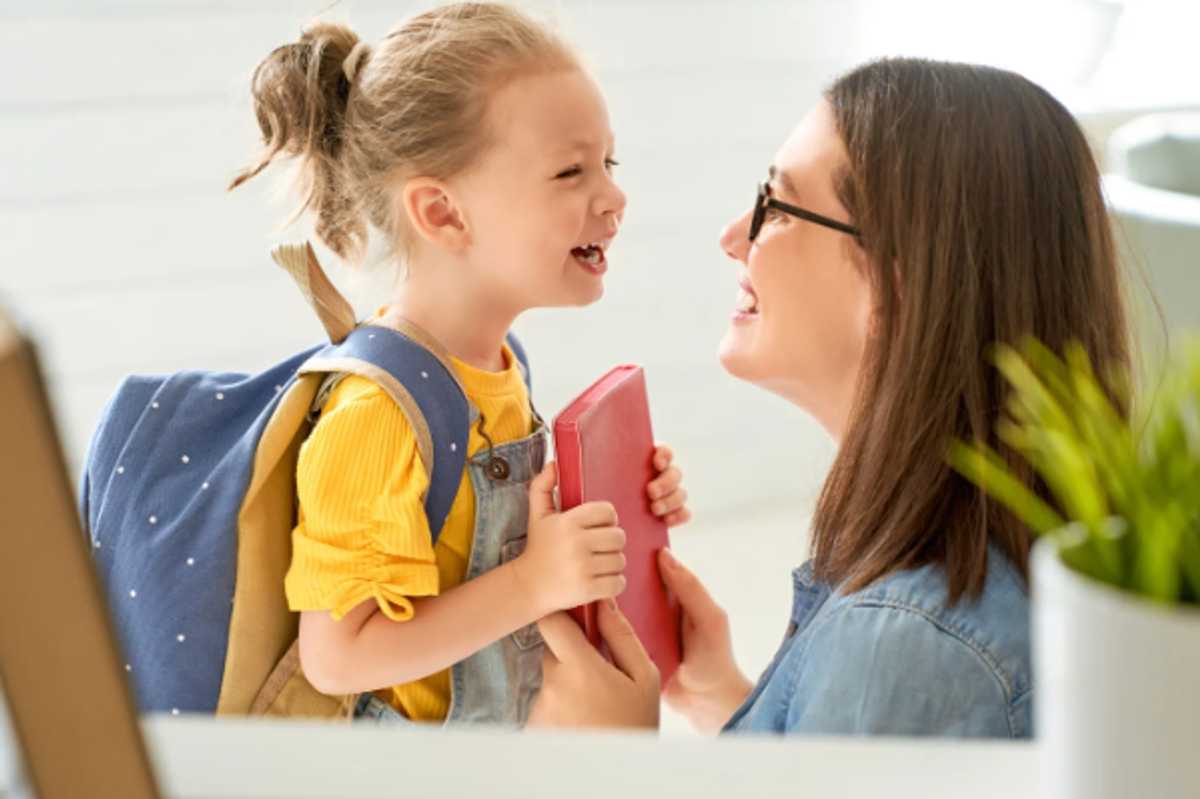PhD parent coach claims we should praise our kids 100 times a day. Here's why.
If they are neurodiverse, they need even more.
A mom praising her daughter.
Praise is one of the most powerful rewards a parent can give a child because it builds their confidence and emotional security. It also reinforces positive behaviors that parents would like to see more often. The only debate is, how much praise is the right amount? Some professionals say too much praise can lead to entitlement, while others say the sky is the limit.
Dr. Chelsey Hauge-Zavaleta, an expert in educational neuroscience, social-emotional learning, educational equity, and building calm, cooperative family relationships, says that children should be praised around 100 times a day and even more if they are neurodiverse.
How often should a child be praised?
“When your child hears 100 times a day, again and again and again, what they do well, what they do well becomes the memory that they have in their brain and body, and they do it more because they've had so many experiences of having it reinforced,” she says.
Dr. Hauge-Zavaleta explains that when your child hears more negativity than positivity, they become more reactive. “When your child receives a lot of negative instruction again and again or just not the positive again and again, the thing that grows is the response to that reactivity. Instead of practicing getting body memories of doing things the right way, they practice reacting and being explosive," she says.
The doctor adds that neurodiverse children need to be praised 462 times a day to counteract the negative messages they receive. By the age of 10, they will have received 20,000 more negative messages than their neurotypical peers. “The playing field is not equal. They're going to have more reactive experiences because they're more constantly being told they're doing the wrong thing,” she says.
In another Instagram post, Dr. Hauge-Zavaleta says the praise must be high-quality, meaning it’s frequent, specific, effusive, and authentic, delivered with touch, immediacy, and in proximity.
@drchelsey_parenting join me for a LIVE webinar THE 100 PRAISE A DAY METHOD: END POWER STRUGGLES WITH YOUR ND KID THIS WEEK!
How in the world can a parent praise their children so many times in one day? Dr. Hauge-Zavaleta suggests that parents use the “sportscaster technique,” narrating their child’s activities and doling out sincere praise when appropriate. In academic circles, the “sportscaster method” is known as PRIDE skills in Parent-Child Interaction Therapy: Praise, Reflect, Imitate, Describe, Enjoy.
Praising your child 10 or more times a day may seem extreme to some. Laura Todd, a licensed therapist, tells Upworthy that it’s okay if parents are a little more considered in their approach. But agrees with Dr. Hauge-Zavaleta in that it must be authentic.
“I think it's more important to focus on the quality of the praise rather than the frequency of the praise. When we provide praise to our child, it should be specific, based on effort rather than outcome, and genuine,” Todd told Upworthy. Ann McKitrick, MS, agrees with Todd. “Praise is appropriate when it is authentic, spontaneous, and sincere,” she told Upworthy. “100 times a day? Feels inauthentic, forced, and certainly not spontaneous if I've got some kind of checklist to follow to 'do it right.' Parents do not need that kind of pressure.”
How to positively redirect your child
A big part of Dr. Hauge-Zavaleta’s message is that we must use praise to combat negative messages. Todd shared some positive examples of redirection with Upworthy.
“The key aspect to focus on is the behavior itself being a problem rather than your child as a person,” Todd says. “For example, hitting is not an appropriate behavior for expressing our anger, but you are allowed to be angry. Then you either talk about or demonstrate the appropriate ways to express your anger, depending on your child's developmental age. This way you separate the behavior from your child's identity and always provide reassurance that they are loved and cared for by you, their parent.”
Whether we praise our child 10 times a day or 10,000, Dr. Hauge-Zavaleta’s message is important: we must be open to praising our children whenever possible and make sure that when we do, we’re being authentic. This way, we can fully express our desires for their behavior, and they receive all the nourishing benefits of praise without it feeling perfunctory.

